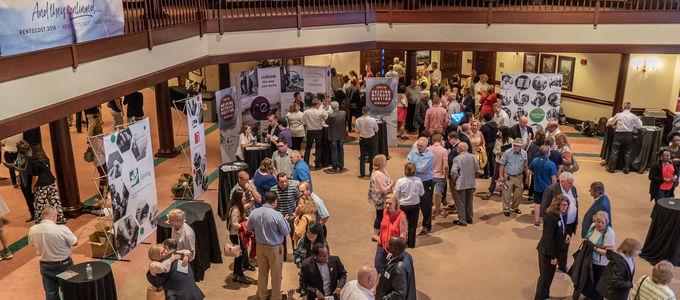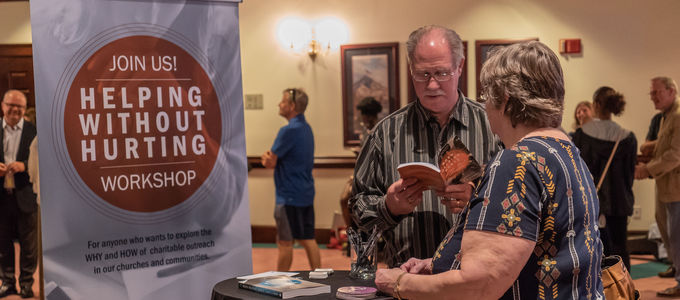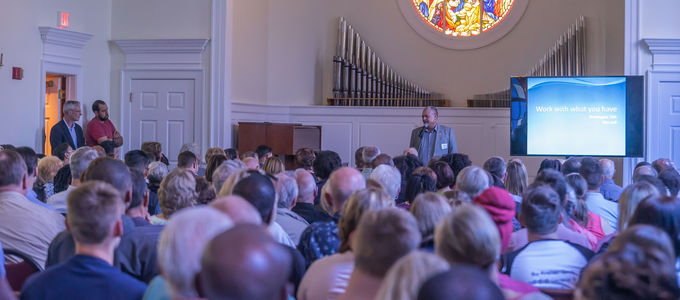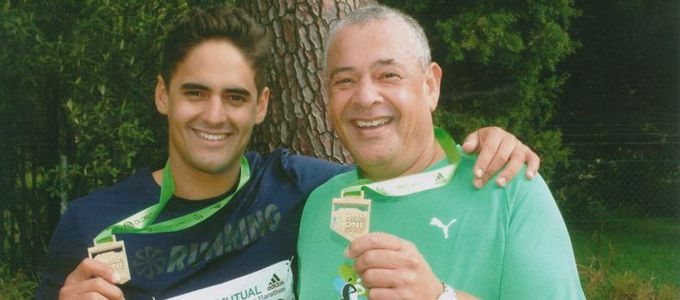
Hylton Memorial Chapel, just outside of Washington, is an ideal venue not only for the first US Church convention but also for the divine service today, Sunday. On Saturday afternoon, the Christian event centre hosted the exhibition NAC Talks.
The first speaker to take to the podium was District Apostle John Kriel from Cape Town in South Africa. His topic “Work with what you have”. Some people, he said, are not happy with what they have. Life has been less than kind to them. He knows how this feels from his own experience. As a young man he had an accident and broke his hip. He had to walk with crutches for the longest time, because one leg was shorter than the other.
Working with what you have
His biggest wish was to one day again be able to walk without crutches, and with hard training he managed. Somebody who saw him walking asked why he was limping. John Kriel’s forthright answer: “I am not limping, I am walking without crutches!”
Years later, he was even able to realise his childhood dream and participate in the Cape Town Marathon. He did not do the entire marathon, “only” half, 21 kilometres. Nor did he run—he walked, but he participated! The District Apostle appealed to the many listeners: “Even if your congregation is small and has little to offer—even if you do not have an organ or a choir: ‘Let us work with what we have.’”
Contrasts and similarities
District Apostle Michael Deppner (Democratic Republic Congo West) provided some interesting insight into his work in the Congo. Under the title “NAC Life in the Congo – urban vs. rural” he showed the big differences between rural and urban congregations. In many villages in the country, there is no electricity. There are no radios, no TVs, and no Internet. The villagers love to sit together, and they form a strong community. Divine services here are a very special offer!
In contrast, the situation in the Congolese capital is completely different. Of the eleven million people in the city, 350,000 are New Apostolic. That means 1,700 New Apostolic congregations in 212 districts in this huge city alone. The challenges here are quite different: there are not enough church buildings within walking distance.
Accepting challenges
District Apostle Raúl Montes de Oca from Brazil also managed to baffle the audience. The huge region he looks after is almost as big as the USA, but with comparatively few New Apostolic congregations. The distances are huge and difficult to manage. Yet, the members are joyful and full of enthusiasm.
In closing, Evangelist Reinhard Kiefer from Germany spoke about the Pentecost theme “And they continued …” from the second book of Acts. The first Christian congregation did not have a building. The members met in the homes of families who had become Christians. In the beginning, they still attended the services in the synagogues, but before long they developed their own very unique values, such as baptism, for example. Since then, it has become the gateway to being a Christian, the theologian explained. “God receives man, and man turns to God. Baptism is both a gift of God as well as man’s profession of faith in Him.”
Pray as Jesus did
The Apostles’ doctrine, of which we read in verse 42 of Acts 2, was not something the Apostles had come up with themselves. “They passed on what they had learned from Jesus, which is why they enjoyed such special authority.”
“The image of breaking the bread means nothing more than that Jesus broke bread with His disciples,” Reinhard Kiefer pointed out. Jesus did that often, he continued. It became a kind of identifying feature of His. Even the Risen Christ was identified by this. “Wherever Christians meet, they break the bread.”
Finally, Acts still mentions prayer. “Jesus is the one who taught people to pray.” Praying like Jesus therefore belongs to the Christian congregation. The Lord’s Prayer, for example, is a model prayer, teaching Christians how to pray: “Brief, precise, and full of praise and gratitude.”


















